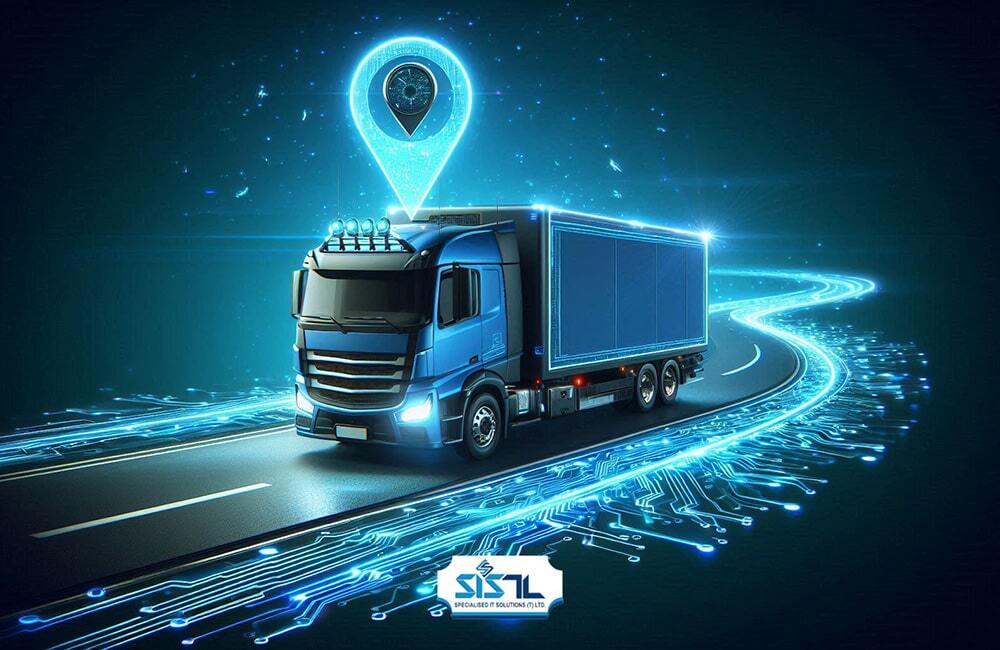
Navigating the Tanzanian Terrain: Conquering Logistics Challenges with Smart GPS Tracking
Tanzania, a land of breathtaking landscapes and burgeoning economic activity, presents a unique set of challenges for cargo companies. From navigating vast distances and often-unpredictable road conditions to ensuring the security and integrity of valuable goods, the logistics sector here demands innovation and resilience. For a cargo company that is a leading player in Tanzania's transportation network, the key to overcoming these hurdles lies in embracing cutting-edge technology: a comprehensive GPS vehicle tracking system integrated with route optimization, fuel monitoring, a tire management system, load monitoring, and a container e-lock system. This powerful suite of tools offered by SISTL in partnership with Wialon has not only streamlined their operations but has also significantly enhanced efficiency, security, and ultimately, customer satisfaction.
The Tanzanian Logistics Landscape: A Minefield of Challenges
Operating a cargo company in Tanzania is not for the faint of heart. Several factors contribute to the complexity of logistics management:
- Vast Distances and Infrastructure Limitations: Tanzania is a large country with a diverse geography. While major highways connect key urban centers, many routes involve traversing long distances over roads that can be poorly maintained, especially during the rainy season. This leads to increased transit times, higher fuel consumption, and greater wear and tear on vehicles.
- Fuel Price Volatility and Pilferage: Fuel costs represent a significant operational expense for any transportation company. In Tanzania, fluctuating fuel prices and the risk of fuel theft can severely impact profitability.
- Tire Management in Harsh Conditions: The demanding road conditions in many parts of Tanzania contribute to accelerated tire wear and tear. Inefficient tire management can lead to frequent replacements, unplanned downtime, and safety hazards.
- Ensuring Cargo Security and Integrity: The risk of theft, tampering, and damage to cargo is a constant conce. Traditional security measures can be vulnerable, necessitating more robust solutions.
- Optimizing Delivery Schedules and Resource Allocation: Coordinating a fleet of vehicles across vast distances, managing delivery schedules, and ensuring timely arrivals can be a logistical nightmare without efficient planning and real-time visibility.
- Communication Challenges: Maintaining consistent communication with drivers and tracking the real-time status of shipments can be difficult in areas with limited network connectivity.
Cargo Company's Technological Arsenal: A Holistic Approach
Recognizing these challenges, the cargo company made a strategic investment in a sophisticated GPS vehicle tracking system that goes far beyond basic location monitoring. Their integrated platform incorporates several key modules:
1. Route Optimization: The Smartest Path to Efficiency
The route optimization module is the coerstone of the cargo company's efficiency drive. This intelligent system analyzes various factors, including:
- Real-time Traffic Conditions: By integrating with traffic data, the system dynamically adjusts routes to avoid congestion, road closures, and accidents, ensuring smoother and faster transit times.
- Delivery Schedules and Time Windows: The system considers pre-defined delivery schedules and customer time windows, planning routes that maximize on-time deliveries and minimize delays.
- Vehicle Capacity and Availability: The system factors in the capacity of each vehicle and its current availability, assigning the most suitable vehicle for each job and optimizing fleet utilization.
- Road Conditions and Vehicle Suitability: By incorporating data on road conditions, the system can suggest routes that are best suited for the type of vehicle being used, minimizing wear and tear and potential breakdowns.
- Multiple Stop Optimization: For routes with multiple delivery points, the system calculates the most efficient sequence of stops, reducing overall travel time and fuel consumption.
Impact: Route optimization has significantly reduced the cargo company's transit times, leading to faster deliveries and increased customer satisfaction. It has also lowered fuel consumption by minimizing unnecessary mileage and idling, contributing directly to cost savings and a reduced carbon footprint. Dispatchers can now proactively manage routes, respond to unforeseen delays, and provide accurate ETAs to customers.
2. Fuel Monitoring: Curbing Costs and Preventing Pilferage
Fuel is a major operational expense, and the cargo company has implemented a robust fuel monitoring system to gain complete visibility and control over their fuel consumption. This module provides:
- Real-time Fuel Level Tracking: Sensors installed in the fuel tanks provide continuous data on fuel levels, allowing for immediate detection of any sudden drops that could indicate theft.
- Fuel Consumption Analysis: The system tracks fuel consumption pattes for each vehicle, providing insights into fuel efficiency and identifying potential issues like excessive idling or inefficient driving habits.
- Refueling Location and Quantity Monitoring: The system records the location and quantity of each refueling, enabling reconciliation with fuel purchase records and detecting any discrepancies.
- Alerts for Abnormal Fuel Activity: The system automatically generates alerts for unusual fuel level changes, excessive consumption, or unauthorized refueling, allowing for prompt investigation and preventative action.
Impact: The fuel monitoring system has been instrumental in reducing fuel theft and identifying areas for improvement in fuel efficiency. By analyzing consumption pattes, the cargo company can provide driver training on fuel-efficient driving techniques and optimize route planning to minimize fuel usage. This has resulted in significant cost savings and increased profitability.
3. Tire Management System: Extending Lifespan and Enhancing Safety
Tire wear and tear are significant conces in the demanding Tanzanian environment. The cargo company's integrated tire management system helps them proactively manage their tire assets, ensuring safety and minimizing replacement costs. This module offers:
- Tire Pressure Monitoring: Real-time monitoring of tire pressure alerts drivers and fleet managers to underinflated or overinflated tires, preventing premature wear, blowouts, and improving fuel efficiency.
- Tire Temperature Monitoring: Monitoring tire temperature helps identify potential issues like excessive friction or bearing problems, preventing tire failures and ensuring safer operations.
- Tire Rotation and Maintenance Scheduling: The system tracks tire usage and mileage, automatically scheduling timely rotations and maintenance, maximizing tire lifespan.
- Tire History and Performance Tracking: Detailed records of each tire, including its history, mileage, and performance, allow for informed decisions regarding maintenance and replacement.
- Alerts for Tire-Related Issues: The system generates alerts for low pressure, high temperature, or excessive wear, enabling proactive maintenance and preventing costly breakdowns.
Impact: The tire management system has significantly extended the lifespan of the cargo company's tires, reducing replacement costs and minimizing downtime due to tire-related issues. Real-time pressure and temperature monitoring have also enhanced safety by preventing blowouts and ensuring optimal vehicle handling.
4. Load Monitoring System: Ensuring Cargo Integrity and Preventing Overloading
Protecting the integrity of the transported cargo and ensuring compliance with weight regulations are paramount. The cargo company's load monitoring system provides real-time insights into the cargo being transported:
- Weight Monitoring: Sensors integrated into the vehicle or trailer continuously monitor the weight of the cargo, preventing overloading, which can damage vehicles, roads, and lead to legal penalties.
- Temperature and Humidity Monitoring (for sensitive goods): For temperature-sensitive cargo like pharmaceuticals or perishable goods, the system monitors temperature and humidity levels within the cargo hold, ensuring they remain within the required range and alerting drivers and dispatchers to any deviations.
- Shock and Vibration Monitoring (for fragile goods): For fragile cargo, the system monitors shock and vibration levels, providing data on any potentially damaging impacts during transit.
- Cargo Presence and Tamper Detection: Sensors can detect the presence of cargo and trigger alerts if unauthorized access or tampering is detected.
Impact: The load monitoring system ensures the safe and secure transportation of goods, minimizing the risk of damage, spoilage, or loss. By preventing overloading, Cargo Company ensures compliance with regulations and reduces wear and tear on their vehicles. Real-time monitoring of environmental conditions for sensitive goods guarantees their integrity throughout the jouey, enhancing customer trust.
5. Container E-lock System: Fortifying Cargo Security
Traditional container seals can be easily tampered with. The cargo company has implemented an advanced container e-lock system to provide an unprecedented level of security for their containerized cargo. This system offers:
- Remote Locking and Unlocking: Containers can be locked and unlocked remotely by authorized personnel, eliminating the need for physical keys and reducing the risk of unauthorized access.
- Real-time Status Monitoring: The system provides real-time information on the lock status (locked or unlocked) and any attempts at tampering.
- GPS Tracking of Containers: The e-lock system often includes integrated GPS tracking, providing the exact location of the container at all times, even when detached from the vehicle.
- Tamper Alerts: Any attempt to force open or tamper with the e-lock triggers immediate alerts to the dispatch center and security personnel.
- Audit Trails: The system maintains a detailed audit trail of all locking and unlocking events, providing a clear record of container access.
Impact: The container e-lock system has significantly enhanced the security of the company's containerized cargo, drastically reducing the risk of theft and pilferage. Real-time monitoring and tamper alerts enable swift intervention in case of security breaches, providing peace of mind to both the company and their clients. The ability to track containers independently also improves logistics management and reduces the risk of lost or misplaced containers.
The Tangible Benefits: A Transformation in Operations
The integration of this comprehensive GPS vehicle tracking system has yielded significant benefits for the cargo company:
- Increased Efficiency: Route optimization and real-time visibility have streamlined operations, reduced transit times, and improved delivery schedules.
- Reduced Operational Costs: Fuel monitoring, efficient tire management, and optimized routes have led to substantial cost savings.
- Enhanced Security: The load monitoring and container e-lock systems have significantly reduced the risk of theft, tampering, and damage to cargo.
- Improved Safety: Real-time monitoring of vehicle parameters and proactive maintenance alerts have enhanced driver and vehicle safety.
- Better Customer Service: Accurate ETAs, timely deliveries, and the assurance of cargo security have led to increased customer satisfaction and loyalty.
- Data-Driven Decision Making: The wealth of data generated by the system provides valuable insights into operational performance, enabling informed decision-making and continuous improvement.
- Improved Compliance: Load monitoring helps ensure compliance with weight regulations, avoiding penalties and ensuring road safety.
Looking Ahead: Embracing the Future of Logistics in Tanzania
The cargo company's successful implementation of this advanced GPS vehicle tracking system serves as a compelling example of how technology can revolutionize the logistics industry in Tanzania and beyond. By embracing innovation, they have not only overcome significant operational challenges but have also positioned themselves as a leader in the market, offering reliable, efficient, and secure cargo transportation services. As technology continues to evolve, this cargo company remains committed to leveraging the latest advancements to further optimize their operations and provide even greater value to their clients, contributing to the growth and development of Tanzania's dynamic economy. Their jouey highlights the transformative power of smart logistics in navigating the unique terrain and demands of the African continent.
6+
Years OfExperience
Connecting You To Smarter Solutions
Empower your fleet with revolutionary IoT solutions. Gain valuable insights from on-board footage with our AI vehicle camera. Optimize operations with real-time GPS vehicle tracking system. Enhance communication with instant Push-to-Talk functionality for your team, wherever they are.


Subscribe to our Newsletter
For the latest insights on AI Vehicle Cameras, GPS Tracking Solutions, Push-To-Talk technology, and exclusive industry updates







Post a comment